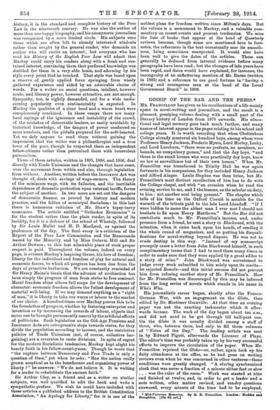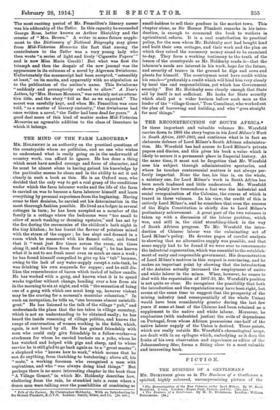GOSSIP OF THE BAR AND THE PRESS, MR. PEANCILLON has
given us his recollections of a life mainly spent in novel-writing and journalism, and the result is a pleasant, gossiping volume dealing with a small part of the literary history of London from 1870 onwards. His educa- tional and legal memory goes back much further, and many names of interest appear in the pages relating to his school and college years. It is worth recording that when Cheltenham College already mustered six hundred boys, among whom were Professor Henry Jackson, Frederic Myers, Lord Morley, Lecky, and Lord Loreburn, "there were no prefects, no monitors, no bounds, no compulsory games," and that the day boys, "and those in the small houses who were practically day boys, knew no law or surveillance but of their own homes." When Mr. Francillon was transferred to Trinity Hall he was again fortunate in his companions, for they included Henry Jackson and Alfred Ainger. Leslie Stephen was then tutor, but Mr. Franoillon's most distinct recollection of him has to do with the College chapel, and with "an occasion when he read the evening service to me, and I the lessons, as the scholar on duty, to him not another soul being present." The chapter which tells of his time on the Oxford Circuit is notable for the warmth of the tribute paid to the late Lord Llandaff. "If I were bidden to name the ablest man I ever• met I should not hesitate to fix upon Henry Matthews." But the Bar did not contribute much to Mr. Francillon's income, and, under preasnre from a friend, he sent a story to Blackwood, with the intention, when it came back upon his hands, of sending it the whole round of magazines, and so putting his disquali- fications for novel-writing beyond dispute. He was not to evade destiny in this way. " Instead of my manuscript promptly came a letter from John Blackwood himself, in such complimentary terms that I bad to read them many times in order to make sure that they were applied by a great editor• to a story of mine." John Blackwood was accustomed to judge every work submitted to him solely upon its merits— he rejected Bontola—and this initial success did not prevent him from refusing another story of Mr. Francillon's. How far Mr. Francillon was discouraged by this may be inferred from the long series of novels which stands in his name in Who's Who.
His journalistic career began, shortly after the Franco- German War, with an engagement on the Globe, then edited by Dr. Mortimer Granville. At that time an evening paper was not the exacting taskmaster which it after- wards became. The work of the day began about ten a.m., and did not need to be got through till half-past one. On the Globe it was usually divided among a staff of three, who, between them, had only to fill three columns of "Notes of the Day." The leading article was sent in by Edward Pigott, afterwards the Licenser• of Plays. The editor's time was probably taken rip by his very successful efforts to improve the circulation of the paper. When Mr. Francillon rejoined the Globe—or, rather, again took np his daily attendance at the office, as be had gone on writing reviews even when he was concerned in other ventures—these conditions were greatly changed. "A staring synchronized clock that was never a fraction of a minute either fast or slow . . . was the ruler of the room." Work wee started at nine and finished at twelve, and, in order to get a leader and a note written, other matter revised, and sundry questions answered, every minute of the time had to be employed.
• Mid.rietorion Ilmaorisa, By B. B. Ihnnollion. Loudon, Hodder and Stoughton. Laos. 01., not.]
The most exciting period of Mr. Francillon's literary career was his editorship of the Taller. In this capacity he succeeded George Rose, better known as Arthur Sketchley and the creator of " Mrs. Brown." A writer in some future supple- ment to the Dictionary of National Biography may glean from Mid-Victorian Memories the 'fact that among the contributors to the Tatter was a very young lady who then wrote "a series of light and lively ' Cigarette Papers ' " and is now Miss Marie Corelli 1 But what was first the triumph and then the despair of the new journal was the appearance in its columns of a novel by Algernon Swinburne. Unfortunately the manuscript had been accepted, "ostensibly at least," on its merits, and apparently with no stipulation as to the publication of the author's name. This Swinburne "suddenly and peremptorily refused to allow." A Year's Letters, by"Mrs. Horace Manners," was certainly not an attrao- tive title, and the story "Fell as flat as we expected." The secret was carefully kept, and when Mr. Francillon was once told, "as a matter of literary curiosity," that Swinburne Lad once written a novel," the Taller had been dead for years." A good deal more of this kind of matter makes Mid. Victorian Memories an agreeable addition to the class of literature to which it belongs.















































 Previous page
Previous page